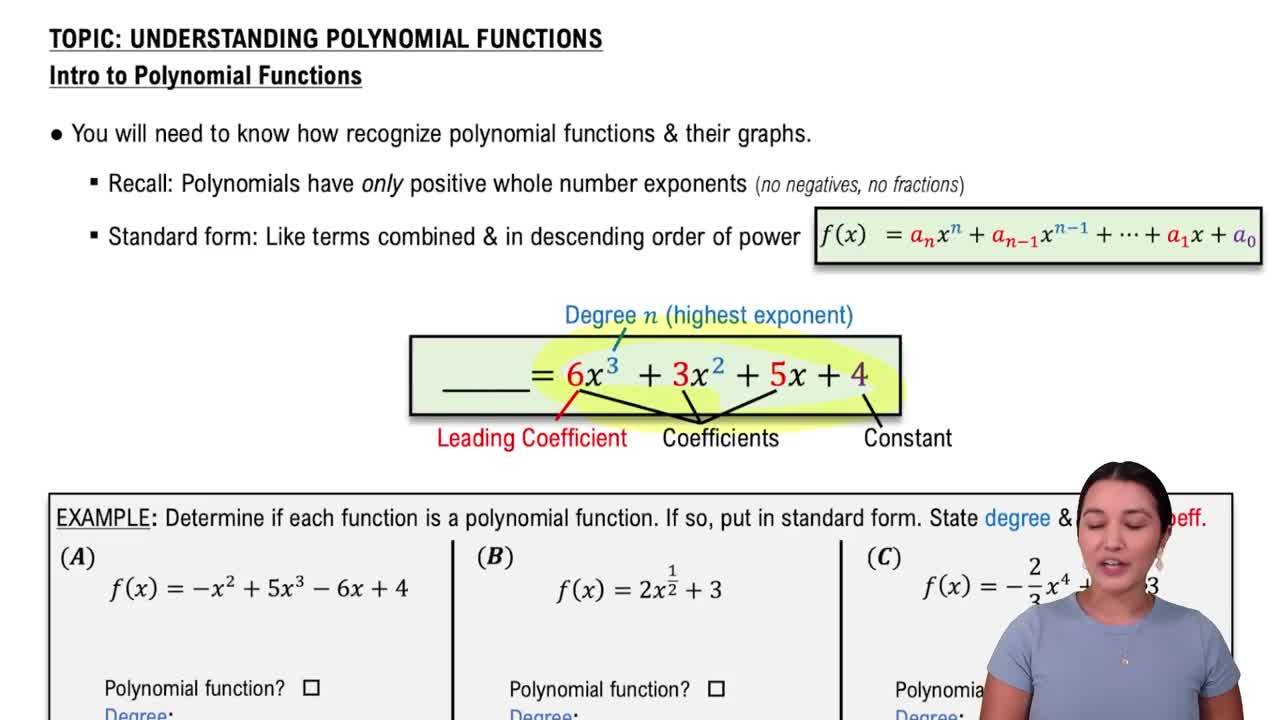Divide using synthetic division. (x4−256)/(x−4)
Table of contents
- 0. Review of Algebra4h 18m
- 1. Equations & Inequalities3h 18m
- 2. Graphs of Equations1h 43m
- 3. Functions2h 17m
- 4. Polynomial Functions1h 44m
- 5. Rational Functions1h 23m
- 6. Exponential & Logarithmic Functions2h 28m
- 7. Systems of Equations & Matrices4h 5m
- 8. Conic Sections2h 23m
- 9. Sequences, Series, & Induction1h 22m
- 10. Combinatorics & Probability1h 45m
4. Polynomial Functions
Dividing Polynomials
Problem 39
Textbook Question
For each polynomial function, use the remainder theorem to find ƒ(k). ƒ(x) = x2 - 5x+1; k = 2+i
 Verified step by step guidance
Verified step by step guidance1
Recall the Remainder Theorem: For a polynomial ƒ(x), the remainder when divided by (x - k) is equal to ƒ(k). So, to find ƒ(k), we simply substitute k into the polynomial.
Identify the polynomial and the value of k: Here, ƒ(x) = x^2 - 5x + 1 and k = 2 + i, where i is the imaginary unit.
Substitute k = 2 + i into the polynomial: Replace every x in ƒ(x) with (2 + i), so write ƒ(2 + i) = (2 + i)^2 - 5(2 + i) + 1.
Expand the squared term: Calculate (2 + i)^2 by using the formula (a + b)^2 = a^2 + 2ab + b^2, where a = 2 and b = i.
Simplify the expression by performing the multiplication and combining like terms, remembering that i^2 = -1.
 Verified video answer for a similar problem:
Verified video answer for a similar problem:This video solution was recommended by our tutors as helpful for the problem above
Video duration:
3mPlay a video:
Key Concepts
Here are the essential concepts you must grasp in order to answer the question correctly.
Polynomial Functions
A polynomial function is an expression consisting of variables and coefficients combined using addition, subtraction, and multiplication, with non-negative integer exponents. Understanding the structure of polynomials helps in evaluating them at specific values, such as complex numbers.
Recommended video:

Introduction to Polynomial Functions
Remainder Theorem
The Remainder Theorem states that the remainder when a polynomial f(x) is divided by (x - k) is equal to f(k). This allows us to find the value of the polynomial at k by evaluating f(k) directly, without performing polynomial division.
Recommended video:

Higher Powers of i
Evaluating Polynomials at Complex Numbers
Evaluating a polynomial at a complex number involves substituting the complex value into the polynomial and simplifying using algebraic rules for complex numbers, including combining like terms and applying i² = -1. This is essential when k is a complex number like 2 + i.
Recommended video:

Dividing Complex Numbers
Related Videos
Related Practice
Textbook Question
276
views
